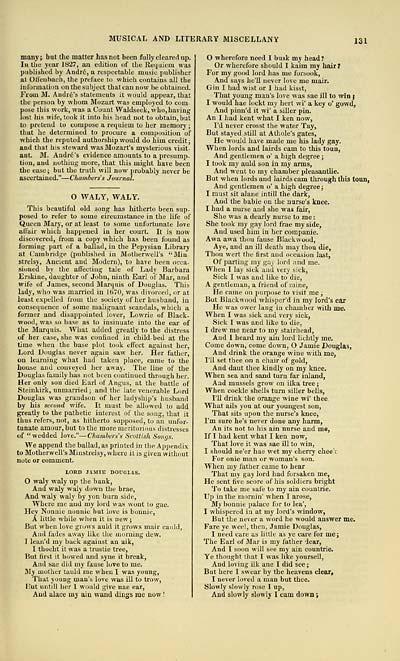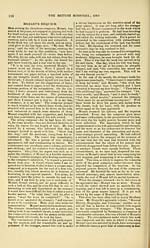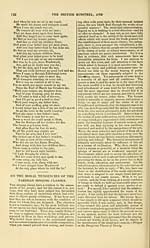Glen Collection of printed music > Printed music > British minstrel, and musical and literary miscellany
(139) Page 131
Download files
Complete book:
Individual page:
Thumbnail gallery: Grid view | List view

MUSICAL AND LITERARY MISCELLANY
131
many; but the matter has not been fully cleared up.
In the year 1827, an edition of the Requiem was
published by Andr6, a respectable music publisher
at Ofl'enbach, the preface to which contains all the
information on the subject that can now be obtained.
From M. Andre's statements it would appear, that
the person by whom Mozart was employed to com-
pose this work, was a Count Waldseck, who, having
lost his wife, took it into his head not to obtain, but
to pretend to compose a requiem to her memory ;
that he determined to procure a composition of
which the reputed authorship would do him credit;
and that his steward was Mozart's mysterious visit-
ant. M. Andre's evidence amounts to a presump-
tion, and nothing more, that this might have been
the case; but the truth will now probably never be
ascertained." — Chambers's Journal.
O WALY, WALY.
This beautiful old song has hitherto been sup-
posed to refer to some circumstance in the life of
Queen Mary, or at least to some unfortunate love
ati'air which happened in her court. It is now
discovered, from a copy which has been found as
forming part of a ballad, in the Pepysian Library
at Cambridge (published in Motherwell's "Min-
strelsy, Ancient and Modern), to have been occa-
siimed by the affecting tale of Lady Barbara
Erskine, daughter of John, ninth Earl of Mar, and
wife of James, second Marquis of Douglas. This
lady, who was married in 1670, was divorced, or at
least expelled from the society of her husband, iu
consequence of some malignant scandals, which a
former and disappointed lover, Lowrie of Black-
wood, was so base as to insinuate into the ear of
the Marquis. What added greatly to the distress
of her case, she was confined in child-bed at the
time when the base plot took effect against her,
Lord Douglas never again saw her. Her father,
on learning what had taken place, came to the
house and conveyed her away. The line of the
Douglas family has not been continued through her.
Her only son died Earl of Angus, at the battle of
Steinkirk, unmarried ; and the late venerable Lord
Douglas was grandson of her ladyship's husband
by his second wife. It must be allowed to add
greatly to the pathetic interest of the song, that it
thus refers, not, as hitherto supposed, to an unfor-
tunate amour, but to the more meritorious distresses
of "wedded love." — Chambers's Scottish Sonc/s.
We append the ballad, as printed in the Appendix
to Motherwell's Minstrelsy, where it is given without
note or comment.
LORD JAMIE DOUGHS.
waly waly up the bank.
And waly waly down the brae,
And waly waly by yon burn side.
Where me and my lord was wont to gae.
Hey Nonnie nonnie but love is bonuie,
A little while when it is new ;
But when love grows auld it grows mair caiild,
And fades away like the morning dew.
1 lean'd my back against an aik,
I thocht it was a trustie tree.
But first it bowed and syne it break,
And sac did my fause love to me.
My mother tauld me when 1 was young.
That young man's love was ill to trow,
But untill her I would give nae ear.
And alace my ain wand dings rae now !
wherefore need I busk my head?
Or wherefore should I kaim my hail?
For my good lord has me forsook.
And says he'll never love me mair.
Gin I had wist or I had kisst.
That young man's love was sae ill to win j
1 would hae lockt my hert wi' a key o' gowd,
And pinn'd it wi' a siller pin.
An I had kent what I ken now,
I'd never crosst the water Tay,
But stayed still at Athole's gates,
He would have made me his lady gay.
When lords and lairds cam to this toun,
And gentlemen o' a high degree ;
I took my auld son in my arms.
And went to my chamber pleasantlie.
But when lords and lairds cam through this toun,
And gentlemen o' a high degree ;
I must sit alane intill the dark,
And the babie on the nurse's knee.
I had a nurse and she was fair,
She was a dearly nurse to me :
She took my gay lord frae my side.
And used him in her companie.
Awa awa thou fause Blackwood,
Aye, and an ill death may thou die,
Thou wert the first and occasion last,
Of parting my g.ij lord and me.
When I lay sick and very sick.
Sick I was and like to die,
A gentleman, a friend of mine,
He came on purpose to visit me ;
But Blackwood whisper'd in my lord's ear
He was ower lang in chamber with me.
When I was sick and very sick.
Sick I was and like to die,
I drew me near to my stairhead,
And 1 heard my ain lord lichUy me.
Come down, come down, O Jamie Douglas,
And drink the orange wine with me,
I'll set thee on a chair of gold,
And daut thee kindly on my knee.
When sea and sand turn far inland,
And mussels grow on ilka tree ;
When cockle shells turn siller bells,
I'll drink the orange wine wi' thee.
What ails you at our youngest son.
That sits upon the nurse's knee,
I'm sure he's never done any harm.
An its not to his ain nurse and me.
If I had kent what I ken now,
That love it was sae ill to win,
I should ne'er hae wet my cheri-y chee'c
For onie man or woman's son.
When my father came to hear
That my gay lord had forsaken me,
He sent five score of his soldiers bright
To take me safe to my ain couutrie.
Up in the mornin' when I arose,
My bonnie palace for to lea',
I whispered in at my lord's window,
But the never a word he would answer me.
Fare ye weel, then, Jamie Douglas,
I need care as little as ye care for me ;
The Earl of Mar is my father dear,
And I soon will see my ain countrie.
Ye thought that I was like yoursell.
And loving ilk ane I did see ;
But here I swear by the heavens clear,
I never loved a man but thee.
Slowly slowly rose I up.
And slowly slowly I cam down ;
131
many; but the matter has not been fully cleared up.
In the year 1827, an edition of the Requiem was
published by Andr6, a respectable music publisher
at Ofl'enbach, the preface to which contains all the
information on the subject that can now be obtained.
From M. Andre's statements it would appear, that
the person by whom Mozart was employed to com-
pose this work, was a Count Waldseck, who, having
lost his wife, took it into his head not to obtain, but
to pretend to compose a requiem to her memory ;
that he determined to procure a composition of
which the reputed authorship would do him credit;
and that his steward was Mozart's mysterious visit-
ant. M. Andre's evidence amounts to a presump-
tion, and nothing more, that this might have been
the case; but the truth will now probably never be
ascertained." — Chambers's Journal.
O WALY, WALY.
This beautiful old song has hitherto been sup-
posed to refer to some circumstance in the life of
Queen Mary, or at least to some unfortunate love
ati'air which happened in her court. It is now
discovered, from a copy which has been found as
forming part of a ballad, in the Pepysian Library
at Cambridge (published in Motherwell's "Min-
strelsy, Ancient and Modern), to have been occa-
siimed by the affecting tale of Lady Barbara
Erskine, daughter of John, ninth Earl of Mar, and
wife of James, second Marquis of Douglas. This
lady, who was married in 1670, was divorced, or at
least expelled from the society of her husband, iu
consequence of some malignant scandals, which a
former and disappointed lover, Lowrie of Black-
wood, was so base as to insinuate into the ear of
the Marquis. What added greatly to the distress
of her case, she was confined in child-bed at the
time when the base plot took effect against her,
Lord Douglas never again saw her. Her father,
on learning what had taken place, came to the
house and conveyed her away. The line of the
Douglas family has not been continued through her.
Her only son died Earl of Angus, at the battle of
Steinkirk, unmarried ; and the late venerable Lord
Douglas was grandson of her ladyship's husband
by his second wife. It must be allowed to add
greatly to the pathetic interest of the song, that it
thus refers, not, as hitherto supposed, to an unfor-
tunate amour, but to the more meritorious distresses
of "wedded love." — Chambers's Scottish Sonc/s.
We append the ballad, as printed in the Appendix
to Motherwell's Minstrelsy, where it is given without
note or comment.
LORD JAMIE DOUGHS.
waly waly up the bank.
And waly waly down the brae,
And waly waly by yon burn side.
Where me and my lord was wont to gae.
Hey Nonnie nonnie but love is bonuie,
A little while when it is new ;
But when love grows auld it grows mair caiild,
And fades away like the morning dew.
1 lean'd my back against an aik,
I thocht it was a trustie tree.
But first it bowed and syne it break,
And sac did my fause love to me.
My mother tauld me when 1 was young.
That young man's love was ill to trow,
But untill her I would give nae ear.
And alace my ain wand dings rae now !
wherefore need I busk my head?
Or wherefore should I kaim my hail?
For my good lord has me forsook.
And says he'll never love me mair.
Gin I had wist or I had kisst.
That young man's love was sae ill to win j
1 would hae lockt my hert wi' a key o' gowd,
And pinn'd it wi' a siller pin.
An I had kent what I ken now,
I'd never crosst the water Tay,
But stayed still at Athole's gates,
He would have made me his lady gay.
When lords and lairds cam to this toun,
And gentlemen o' a high degree ;
I took my auld son in my arms.
And went to my chamber pleasantlie.
But when lords and lairds cam through this toun,
And gentlemen o' a high degree ;
I must sit alane intill the dark,
And the babie on the nurse's knee.
I had a nurse and she was fair,
She was a dearly nurse to me :
She took my gay lord frae my side.
And used him in her companie.
Awa awa thou fause Blackwood,
Aye, and an ill death may thou die,
Thou wert the first and occasion last,
Of parting my g.ij lord and me.
When I lay sick and very sick.
Sick I was and like to die,
A gentleman, a friend of mine,
He came on purpose to visit me ;
But Blackwood whisper'd in my lord's ear
He was ower lang in chamber with me.
When I was sick and very sick.
Sick I was and like to die,
I drew me near to my stairhead,
And 1 heard my ain lord lichUy me.
Come down, come down, O Jamie Douglas,
And drink the orange wine with me,
I'll set thee on a chair of gold,
And daut thee kindly on my knee.
When sea and sand turn far inland,
And mussels grow on ilka tree ;
When cockle shells turn siller bells,
I'll drink the orange wine wi' thee.
What ails you at our youngest son.
That sits upon the nurse's knee,
I'm sure he's never done any harm.
An its not to his ain nurse and me.
If I had kent what I ken now,
That love it was sae ill to win,
I should ne'er hae wet my cheri-y chee'c
For onie man or woman's son.
When my father came to hear
That my gay lord had forsaken me,
He sent five score of his soldiers bright
To take me safe to my ain couutrie.
Up in the mornin' when I arose,
My bonnie palace for to lea',
I whispered in at my lord's window,
But the never a word he would answer me.
Fare ye weel, then, Jamie Douglas,
I need care as little as ye care for me ;
The Earl of Mar is my father dear,
And I soon will see my ain countrie.
Ye thought that I was like yoursell.
And loving ilk ane I did see ;
But here I swear by the heavens clear,
I never loved a man but thee.
Slowly slowly rose I up.
And slowly slowly I cam down ;
Set display mode to: Large image | Transcription
Images and transcriptions on this page, including medium image downloads, may be used under the Creative Commons Attribution 4.0 International Licence unless otherwise stated. ![]()
| Special collections of printed music > Glen Collection of printed music > Printed music > British minstrel, and musical and literary miscellany > (139) Page 131 |
|---|
| Permanent URL | https://digital.nls.uk/91436613 |
|---|
| Description | Scottish songs and music of the 18th and early 19th centuries, including music for the Highland bagpipe. These are selected items from the collection of John Glen (1833 to 1904). Also includes a few manuscripts, some treatises, and other books on the subject. |
|---|
| Description | The Glen Collection and the Inglis Collection represent mainly 18th and 19th century Scottish music, including Scottish songs. The collections of Berlioz and Verdi collected by bibliographer Cecil Hopkinson contain contemporary and later editions of the works of the two composers Berlioz and Verdi. |
|---|

